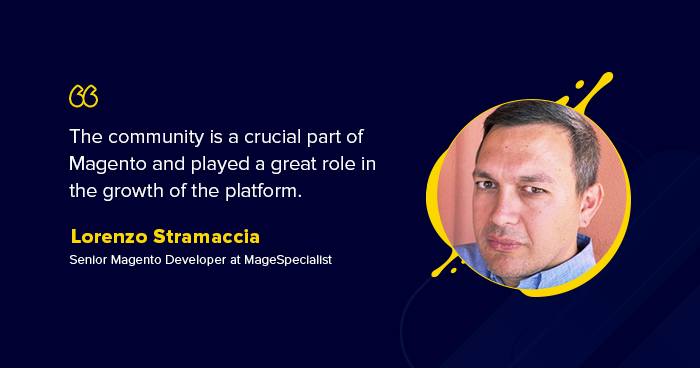
Being part of the Magento community can feel deeply inspirational because you will always find people who can help you learn and grow, and find solutions for your problems. One such person is certified Magento developer Lorenzo Stramaccia, who has more than 5 years of experience working with the Magento ecommerce industry. He is currently working with MageSpecialist/Skeeller as a Senior Magento resource.
Lakhan: Hi Lorenzo, it’s lovely to have you with us! Could you please tell our readers about yourself? Walk us through your journey so far.
Lorenzo: Thank you for inviting me! I’m Lorenzo, a 40 year old software engineer from a wonderful place in the middle of Italy called Umbria. I’m currently working at Skeeller | Adiacent Company (formerly known as MageSpecialist) as an Innovation Manager and front-end tech leader.
To rewind, I started my journey with computing quite early, about 35 years ago, when my father brought home a Macintosh Plus. Curiosity and passion drove me to learn various programming languages when I was a teenager. I must admit that with no internet at home and nobody to ask for help, it was hard, but also fun.
Lakhani: Was there a special reason you chose to work with Magento over the other ecommerce platforms available? What would you say is the importance of using Magento to you?
Lorenzo: I first met Magento when I started to work at MageSpecialist in 2015. The agency had a lot of customers with stores based on Magento 1. I mostly worked on frontend at that time and took my first certification as a “Magento Certified Front End Developer”.
Magento 2 was a big change, a new ecommerce platform based on a new framework. It enabled us to enter the enterprise market and solve complex problems for our customers. It helped us to make a big step as an agency and grow professionally.
Lakhani: You have been helping store owners with ecommerce store development. What’s your thought process before getting into any project?
Lorenzo: It is always exciting to start a new project from scratch. I think it is really important to have a clear list of requirements to understand what the customer expects. It is crucial to focus where the customer sees the real value, and to have a quick feedback loop.
Lakhani: For those who want to learn Magento, what advice would you give them regarding the Magento Certificate?
I will not lie, Magento is not easy. You need a solid background on PHP and OOP, and familiarity with concepts like the Dependency Inversion Principle and relational databases. When Magento 2 was first released, we attended an online course from Magento U, and I have to say that it helped a lot. Another great way to learn is to simply work with it, starting with simple customizations, and when you have doubts, take a look at the core modules code.
I passed the requirements for “Magento 2 Certified Professional Front End Developer” (now “Adobe Certified Expert-Adobe Commerce Front-End Developer”) and the “Magento 2 Certified Professional Developer” (now “Adobe Certified Expert-Adobe Commerce Developer”), all thanks to my experience while working.
Lakhani: What are your thoughts on Headless, PWA, and other related technologies? How are they going to benefit the merchants and ecommerce industry?
Lorenzo: Magento 2 frontend stack is quite dated and it’s difficult to optimize. There were no changes since the first release of Magento 2.0. In the meantime, the front-end world has moved (and continues to move) really fast. Moreover, some aspects are quite debatable, like UI components and the checkout architecture.
A headless approach is one way to resolve this issue. It’s quite easy to find React or Vue devs nowadays, while, I can assure you, it is quite hard to hire good Magento developers. We’ve used React in the past to replace some elements of Magento, like the checkout or the minicart, but it obviously depends on what the customer wants.
Headless/PWA are not for everyone. We are working on a React-based PWA frontend for one of our biggest customers, but we are also working on other projects with Hyvä and I’m really enjoying it. Hyvä demonstrates that you don’t need to go headless to have great performance, and it is really simple to work with it. It is just the Magento layout system with Tailwind Css and Alpine.js.
Lakhani: What do you think about the Magento community? How important is it for the growth of the Magento platform?
Lorenzo: The community is a crucial part of Magento and played a great role in the growth of the platform. We also hosted some contribution days in the past, but in the last few years we have lost something. It became harder to contribute due to the endless review process and some people simply stopped contributing, myself included.
Recently there was an open letter from the Magento Open Source Community Alliance to “save the monolith” by forking it, since the Adobe strategy is probably to replace it with a set of microservices.
Now, I don’t know what Adobe will do with Magento, but I’m happy that the community is trying to take such a step. It’s not as easy as writing a letter, but I would like to contribute if I can.
Lakhani: What are your thoughts on online Magento events, and which events are you excited about for this year?
Lorenzo: Online events have some pros and cons. You can participate even if you’re on the other end of the world, but on the other side you miss the atmosphere and the possibility of chatting with people in the breaks.
I’m looking forward to Reaction in October, as last year’s event was really interesting.
Lakhani: How do you think these events improve the Magento experience?
Lorenzo: You can relate with people doing the same job in different countries. It is always a learning experience to hear a different voice, maybe with a different point of view. You will also learn something new from the speakers – they usually are really good devs.
Lakhani: Where do you see Magento in the future? Any predictions for 2022?
Lorenzo: Ecommerce is growing and Magento will continue to grow. I don’t expect radical changes in Magento itself. According to the Adobe release timeline, we will have 2.4.4 with PHP 8.1 support but there is no other planned feature from what I know. Maybe there will be something exciting from the community, who knows.
Lakhani: Can you please share a picture of your workplace? And do you have any tips on making a productive workstation, since many of us are still working from home?
Lorenzo: Sure, I’m working from home too and I have no plans to go back to the office. My suggestion is to invest in an ergonomic chair – adjustable armrests and lumbar support can change your life. Noise-cancelling headphones are also a good investment to isolate yourself and concentrate, but you will not hear the doorbell…or your wife.

Lakhani: Who are the top influencers that inspire you?
Lorenzo: We are lucky enough to be able to use Linux and Git from Linus Torvalds, or an amazing software like Redis from Salvatore Sanfillippo. There are a lot of great minds that decided to release their work as open source software. This has enabled a lot of people to have jobs and a better living.
How many Laravel/Symfony/Node.js (etc…) developers jobs exist thanks to the creator of these frameworks? I’m really grateful to these kinds of people.
Lakhani: What does your work-life balance look like? Are there any activities you enjoy in your spare hours? You can share any pictures you like here!
Lorenzo: Now I can say that it is quite balanced. Before, when I needed to commute, it was a little stressful spending almost 2 hours a day driving.
I have a 3 year old son Filippo, and as you can guess, almost all of my spare time is dedicated to him. We spend time playing with trains, building tracks or building with Duplo bricks (a bigger kind of Lego). Last Saturday we went to an agricultural fair so he could see tractors and farm animals!


I also like to have a walk in nature whenever I can – it helps since my days are mostly sedentary.
One thing that I really like and I miss is travelling abroad. Fortunately, I live in Italy where there are a lot of wonderful places to discover.
Lakhani: What resources do you think newbies would find helpful for learning Magento development?
Lorenzo: In the past, I’ve found a lot of interesting articles in Alan Storm’s blog. He digs deep in the architecture and explains how things work. I also found it useful to look in the Magento code. I often suggest to my coworkers to take a look in some specific core module when they ask for help. If you need to handle customers, a good place to find ideas is the Magento Customer module, and if you need to manage orders, the Magento Sales module is a good place to start. And so on.
Nowadays there are a lot of online resources. When we need to train new devs, we also use Vinai Kopp’s videos from Mage2Tv.
This is not focused on Magento but related to PHP and Laravel – I enjoy reading the blog posts from the Spatie team members that you can find at freek.dev or stitcher.io
Lakhani: Please share your tips and advice with our readers.
Larenzo: Read the docs! It can save you a lot of time 😉 and remember to take a break when you’re stuck.
Testing is important, but you don’t need to test everything. In Magento it can be hard. Test the core features you implement, like products import, orders export and so on. For one of our customers, we have developed a custom discount engine that is fully covered by tests, so each time we make a modification we update the related tests. They also help a lot during Magento upgrades.
One piece of advice I often give is to try to master your tools. For example, I work with PHPStorm and I have a plugin (Key Promoter X) that shows me the keyboard shortcut to use each time I use the mouse to do something.
There are also some nice video courses at Laracast for PHPStorm and VSCode.
Abdur Rahman
Abdur Rahman is the Magento whizz at Cloudways. He is growth ambitious, and aims to learn & share information about Ecommerce & Magento Development through practice and experimentation. He loves to travel and explore new ideas whenever he finds time. Get in touch with him at [email protected]


